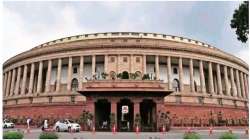Stormy Winter Session ahead? Opposition looks to corner govt on Citizenship Bill & other issues
Parliament's Winter Session starting tomorrow is expected to witness much heat as the Opposition looks to corner the Union government over issues like economic slowdown and situation in Kashmir while the Modi dispensation seeks to push through the contentious Citizenship (amendment) Bill, a key part of the BJP's ideological agenda.

Parliament's Winter Session starting tomorrow is expected to witness much heat as the Opposition looks to corner the Union government over issues like economic slowdown and situation in Kashmir while the Modi dispensation seeks to push through the contentious Citizenship (amendment) Bill, a key part of the BJP's ideological agenda.
Prime Minister Narendra Modi in his customary remarks at a session eve all-party meeting held on Sunday asserted that the government is ready to discuss every issue and exhorted everyone to make the Winter session as productive as the last one, when Parliament gave its nod to the bifurcation of the then state of Jammu and Kashmir and nullifying Article 370, besides several other important bills.
Opposition leaders, including Ghulam Nabi Azad of the Congress, raised the continuing "illegal" detention of mainstream leaders in Jammu and Kashmir like Farooq Abdullah, who is also a Lok Sabha member, and said they will take up issues like economic slowdown and unemployment in the session, which ends on December 13.
After the BJP-led NDA left the opposition stunned in the last session by winning over independent regional parties, especially in Rajya Sabha where treasury benches lacked majority, and wooing a number of rival leaders to get a host of bills passed, the Congress-led grouping has some reasons to feel emboldened over recent political developments,
Its better than expected show in the recent assembly polls, BJP's break in ties with Shiv Sena and reports of economic slowdown have put wind in the sails of opposition parties.
The 18 Sena MPs in Lok Sabha and three in Rajya Sabha have now been allotted seats in the opposition rows after the party severed ties with its longtime ally BJP and is in talks with the Congress-NCP alliance to form government in Maharashtra.
Despite the setback, numbers favour the treasury benches with the BJP appearing determined to get Parliament's approval on its legislative agenda that was stonewalled in the Modi government's first term when opposition outnumbered it in the Upper House.
The Supreme Court verdict in the Ayodhya case favouring a Ram temple at the disputed site has also come has a boost to the saffron ranks.
The government has listed Citizenship (amendment) Bill, a key BJP plank which is aimed at granting nationality to non-Muslim immigrants from neighbouring countries, for passage in this session.
The Modi government had introduced the bill in its previous tenure as well but could not push it through due to vehement protests by opposition parties, which criticised the bill as discriminatory on religious grounds.
The legislation seeks to grant Indian citizenship to Hindus, Jains, Christians, Sikhs, Buddhists and Parsis from Bangladesh, Pakistan and Afghanistan if they have fled their respective country due to religious persecution.
There has been opposition to the bill in Assam and other Northeastern states, where most of these immigrants, mostly Hindus, have been living.
The government also plans to seek Parliament's nod to two crucial ordinances. An ordinance reducing corporate tax rate for new and domestic manufacturing companies to arrest slowdown in the economy and boost growth was issued in September to give effect to amendments in the Income Tax Act, 1961 and Finance Act, 2019.
The second ordinance, also issued in September, banned sale, manufacture and storage of e-cigarettes and similar products.
This is the second Parliament session of the BJP-led NDA government which returned to power with a greater mandate in the recent Lok Sabha elections.
During its first session, the government got Parliament's approval to key legislations like the bill to criminalise the practice of instant triple talaq and the other giving more powers to the National Investigation Agency.
It was the most productive session in Lok Sabha since 1952 as 35 bills were passed. A total of 32 bills were cleared in Rajya Sabha.
The two Houses also passed a resolution scrapping special status accorded to Jammu and Kashmir and bifurcating the state into two union territories of Jammu and Kashmir, and Ladakh.
At another all-party meeting, which was convened by Speaker Om Birla on Saturday, the opposition said it will seek answers from the government on issues such as slowdown in economy, farmer distress, unemployment and situation in Jammu and Kashmir after its special status was scrapped in August.
After the meeting, Modi had tweeted, "We look forward to a productive Parliament session, where people-centric and development oriented issues would be discussed." During the session, a special joint sitting of both the Houses has been planned to mark Constitution Day on November 26.